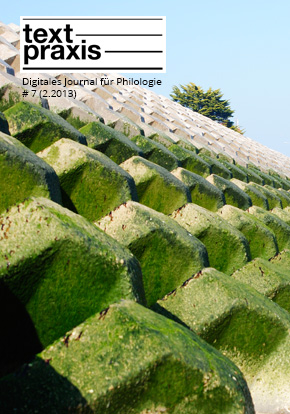Digital Journal for Philology

Textpraxis # 7 (2.2013)
In the current issue, Kirkland A. Fulk analyses Alexander Kluges Die Ungläubige, Peer Trilcke investigates the possibilities of a sociology of literature of the internet and Earl Jeffrey is concerned with the ›digital turn‹ in literary studies. In the ›Debate‹ section, David-Christopher Assmann presents another response article and thus continues the discussion about system-theoretical literary studies.
This paper explores Alexander Kluge’s forgotten work of science fiction Die Ungläubige , Kluge’s literary addendum to Die Artisten in der Zirkuskuppel: ratlos , and places it against the background of the aesthetic debates of 1968 and Kluge’s larger canon. Why did Kluge turn to science fiction at this particular time? How does this genre interrogate, expand on, or even challenge our understanding of Kluge and his aesthetic project, which in many ways cannot be thought apart from this pivotal period in German post-war history? Kluge’s text is at once a sharp critique of capitalist structures and a critical representation of utopian visions of the future, making the work an important piece of aesthetic, social and political commentary.
The essay outlines and exemplifies the possibilities of a literary sociology of the Internet and calls in this regard for a empiricization of research on this rapidly growing, but so far only superficially described field of communication about literature. For this purpose, the literary Internet Studies and their literary-sociological part are located within the general Digital Humanities. As an example for relational-empirical literary sociology of the Internet, the first results of an analysis of a so-called ›book blogotope‹ are presented. Based on that example, some mechanisms of secondary literary communication can be discussed.
In this lecture, which was organized by the project group ›Digital Humanities‹ (Münster, July 17 2013), Earl Jeffrey Richards discusses the possibilities of digital philology. In his historical analysis he comes across hypertext methods, which were used in theology and philology already many centuries ago. Richards furthermore shows that digital philological procedures prove to be optimal solutions not only in editions and compare projects, but also allow a de-hierarchization of the canon formation.
